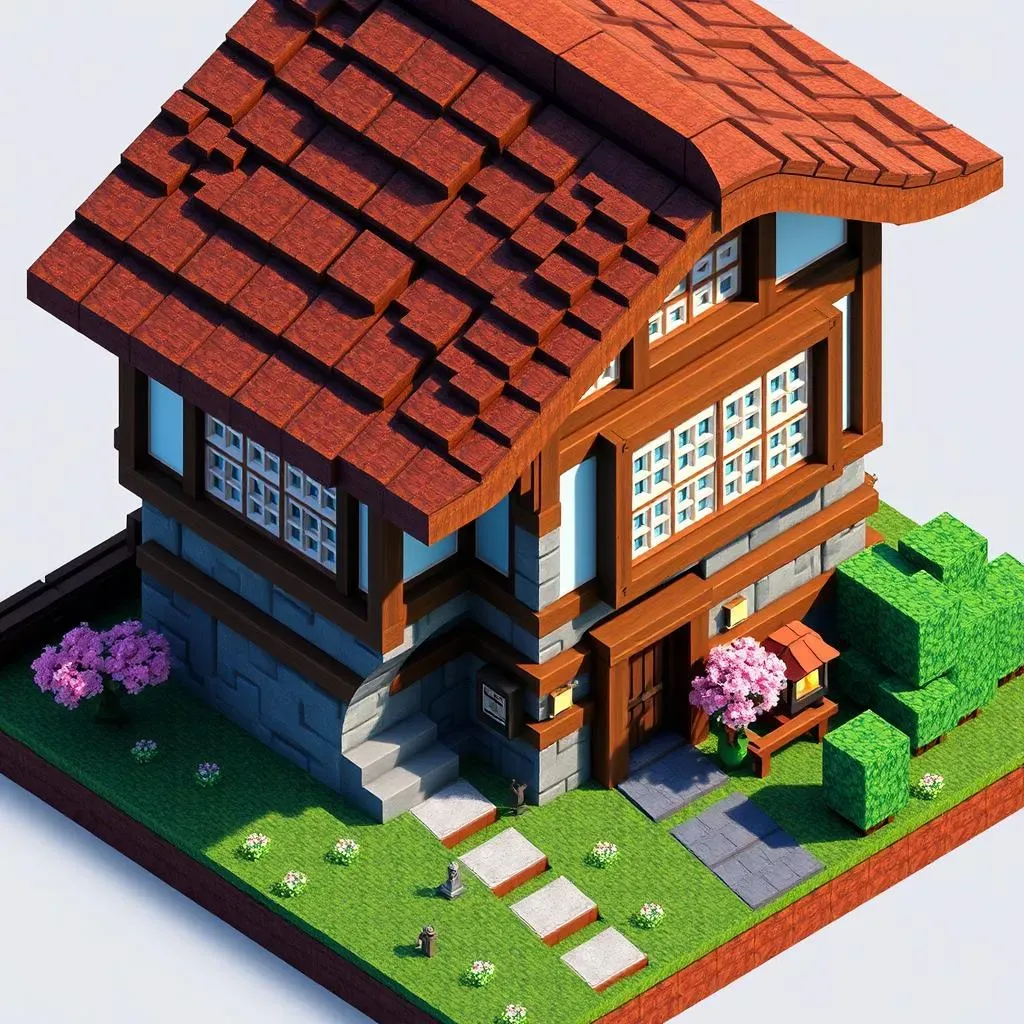Table of Contents
Ever wanted to build something truly special in Minecraft? Something that stands out from the usual blocky builds? I get it. I've spent countless hours in the game, and nothing quite matches the elegance of a traditional Japanese house. These aren't just simple boxes; they're masterpieces of design, especially the roof. That iconic, curved roof is what makes a Japanese house instantly recognizable. In this article, I'm going to walk you through how to construct your very own minecraft japanese house with traditional roof. We'll start by looking at what makes Japanese architecture unique. Then, we'll get into the nitty-gritty of choosing the right materials and blocks for your build. I'll break down the roof construction, step-by-step, so you won't get lost. Finally, we'll add those extra little details that will make your house look like it came straight from a Japanese village. Get ready to take your Minecraft building skills to a whole new level.
Understanding Japanese Architecture for Your Minecraft House
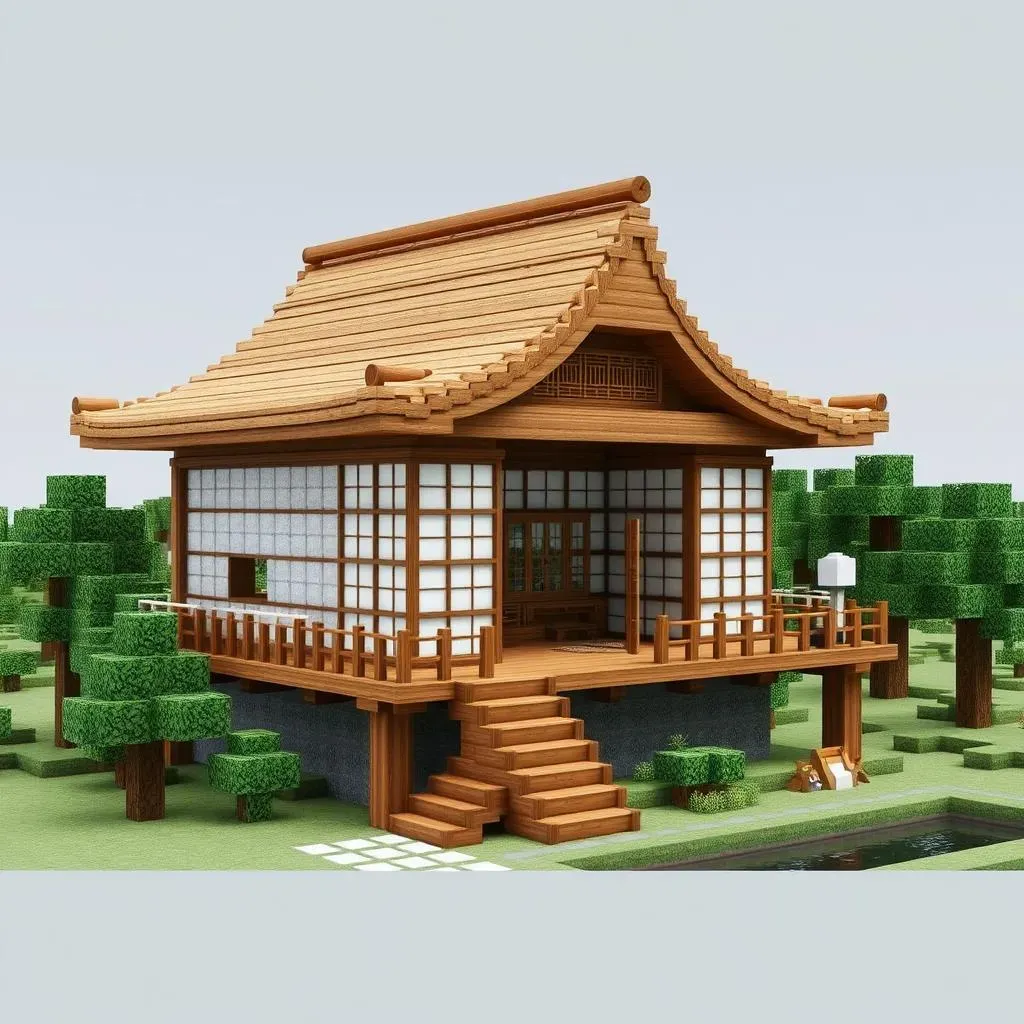
Understanding Japanese Architecture for Your Minecraft House
The Essence of Japanese Design
Okay, so you want to build a Japanese house in Minecraft, right? It's not just about slapping some wood together; it's about understanding the core principles of Japanese architecture. Think simplicity, harmony with nature, and a touch of elegance. Japanese homes aren't about being flashy, they're about being functional and beautiful in a quiet way. They often feature clean lines, open spaces, and a seamless connection between the indoors and outdoors. That's why you'll see a lot of wood, paper screens (we'll use white wool or concrete in Minecraft), and natural colors.
It's about creating a sense of peace and tranquility. Forget about the giant, imposing castles; we're going for something that feels more like a peaceful retreat. This is something that is very important for your build.
Key Elements to Keep in Mind
When you are thinking about your Minecraft build, you have to remember some key features. First, the roof is the most important element. It's not just a cover; it's a statement. The curved shape, often with upturned corners, is a classic Japanese design element. Then, you have the use of natural materials, like wood and bamboo. Since we can't use bamboo in Minecraft, we'll use wood. You'll also see features like sliding doors, known as shoji screens, and verandas that wrap around the house. These elements are not just for show; they are there to create a sense of openness and connection to the surrounding environment.
Element | Description | Minecraft Equivalent |
|---|---|---|
Curved Roof | A signature feature with upturned corners | Wooden stairs, slabs |
Natural Materials | Wood, bamboo, paper | Wood, white wool/concrete |
Sliding Doors (Shoji) | Paper screens that allow light and air | White wool/concrete, trapdoors |
Verandas | Covered porches that connect the house to the garden | Wood planks, fences |
Translating it to Minecraft
Now, how do we take all of this and put it into Minecraft? It's not about making a perfect replica, it's about capturing the essence of Japanese design. We'll use wood for the main structure, smooth stone for the foundation, white wool or concrete for the walls, and wooden stairs and slabs for the roof. Instead of paper screens, we can use white concrete or wool, and maybe even trapdoors to create a similar effect. Remember, it's all about creating a build that feels both functional and visually appealing, using the blocky tools Minecraft gives us. It's about taking those principles and making them work in our world.
Don't feel pressured to make it perfect, just try to capture the spirit of Japanese design.
Materials and Blocks: Choosing the Right Palette for Your Minecraft Japanese House
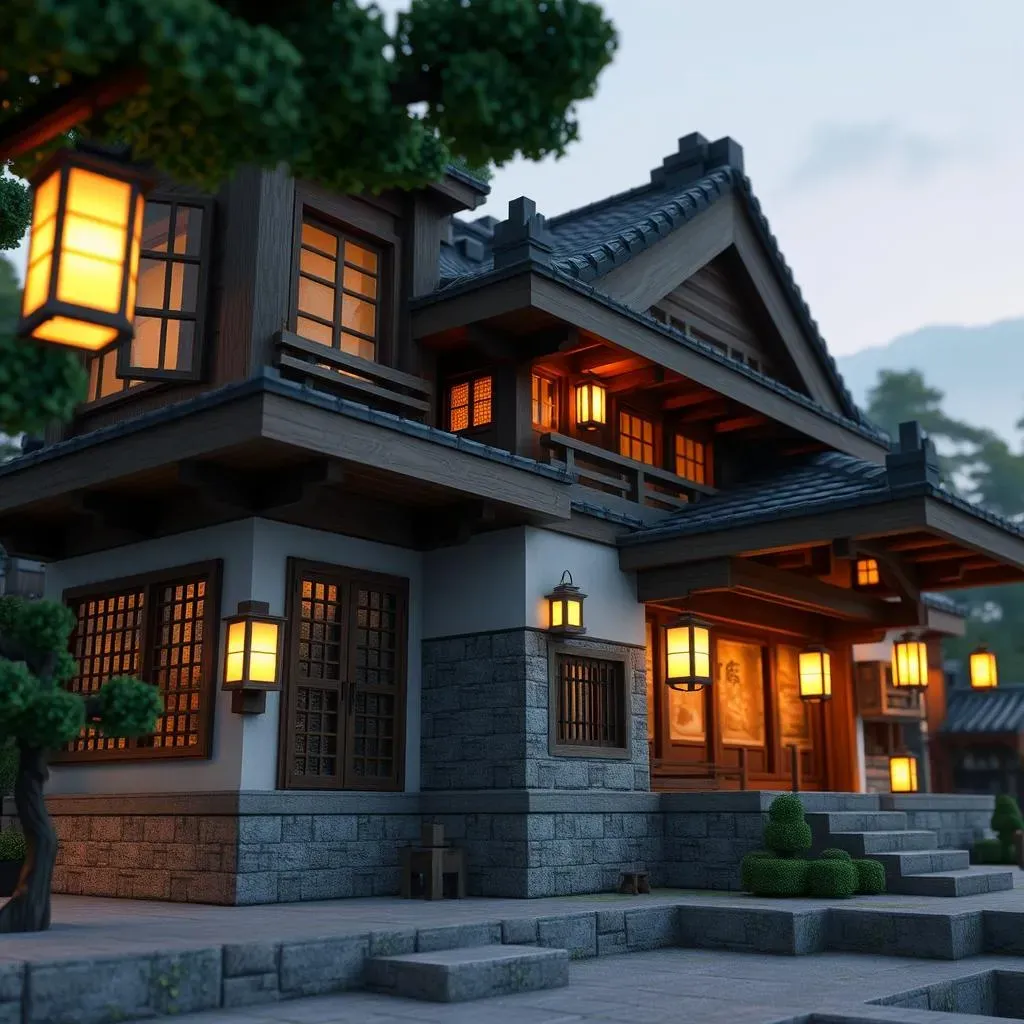
Materials and Blocks: Choosing the Right Palette for Your Minecraft Japanese House
Wood: The Heart of Your Build
Alright, let's talk wood. This is going to be your main building material, so choose wisely. Dark oak is a good option for a traditional look. The rich, dark color gives a sense of age and stability, which fits perfectly with Japanese design. Spruce is another solid choice, especially if you want a slightly lighter, more modern feel. I've used both, and each gives a different vibe. But honestly, the beauty of Minecraft is you can experiment! Don't be afraid to mix and match, just keep in mind the overall feel you're going for. Consistency is key here, it help the build feel more natural and not out of place.
It is also important to remember that you need to use the same wood for the roof, to keep it consistent. So pick wood wisely!
Stone, Concrete, and Other Details
Now, let's move beyond wood. For the foundation, I recommend using smooth stone or stone bricks, they provide a nice, solid base for your build. White concrete or wool is perfect for the walls, they mimic the look of paper screens you see in traditional Japanese homes. For accents, try using dark prismarine blocks to add a pop of color here and there, or even stripped logs for some texture. Don't underestimate the power of small details. A few carefully placed lanterns can really bring your build to life. And speaking of details, we will add some later in the article, so don't worry.
It is important to keep the color palette consistent, so you need to think about the colors that you will use for the entire build. Don't go overboard with the colors, keep it simple.
Material | Use | Why? |
|---|---|---|
Dark Oak Wood | Main Structure, Roof | Rich, traditional look |
Spruce Wood | Main Structure, Roof | Lighter, modern feel |
Smooth Stone/Bricks | Foundation | Solid, grounding base |
White Concrete/Wool | Walls | Mimics paper screens |
Dark Prismarine | Accents | Adds a pop of color |
Lanterns | Lighting | Brings build to life |
StepbyStep Guide: Building a Traditional Japanese Roof in Minecraft
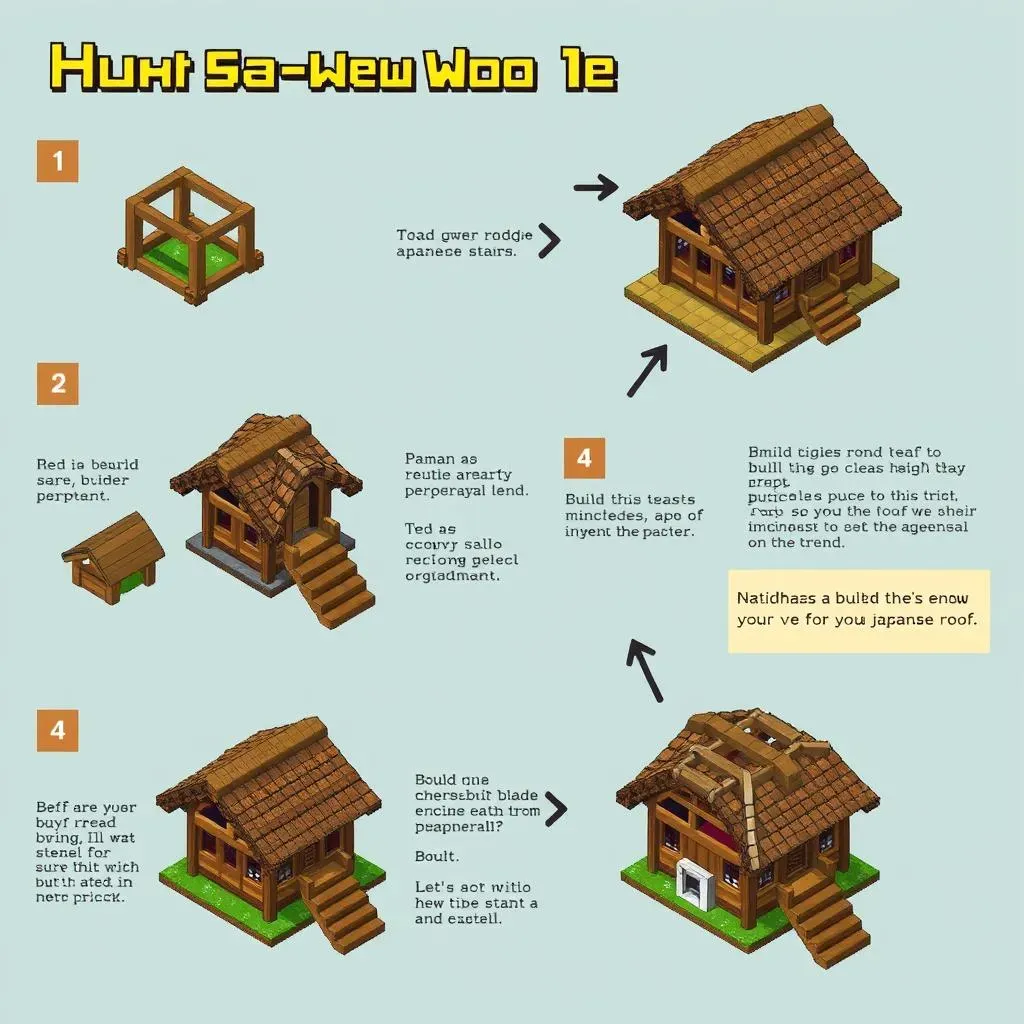
StepbyStep Guide: Building a Traditional Japanese Roof in Minecraft
Getting Started: The Base of Your Roof
Okay, let's get to the fun part: building that iconic roof. First things first, you need to establish the base. Start by outlining the perimeter of your roof using your chosen wood planks. Think of this as the foundation for everything else. This initial layer should extend one block out from your house's walls. This creates that classic overhang we often see in Japanese architecture. Now, you can build a simple flat roof, but we're going for that traditional curve, so we need to prepare for that. Make sure your base is sturdy and even, because everything we add on top of it will depend on it. This first step is crucial for the rest of the roof, so take your time and get it right.
I always find that having a picture of a real Japanese roof handy helps me visualize what I'm aiming for. It's like having a blueprint right in front of you. Do not be afraid to look for references, this will help you a lot!
Creating the Curve: Stairs and Slabs
Here’s where the magic happens. Now, grab your wooden stairs. Place these upside down, along the outer edge of your base, so that they are hanging off the side. This is the start of that curve. Then, add another layer of upside-down stairs right above the first one. This creates a gentle slope. You can keep adding stairs, each layer a block inward, until you reach the peak of the roof. To smooth out the curve, use wooden slabs. Place these on top of the stairs to give a more gradual look. Play around with the placement of stairs and slabs, to get the curve you want. It will take time and practice, but you will get there. This is where you can really get creative and add your personal touch to the build.
Step | Action | Description |
|---|---|---|
1 | Perimeter | Outline roof base with wood planks, one block out from the wall |
2 | First Layer | Place upside-down wooden stairs along the edge of the base |
3 | Second Layer | Add another layer of upside-down stairs above the first one, one block inward |
4 | Smooth Curve | Use wooden slabs on top of stairs to create a smoother transition |
Adding the Details: The Finishing Touches
The roof is almost done, now we need to add the little things that makes it look amazing. For those upturned corners, use a combination of stairs and slabs, to make them feel natural. You can also add a small decorative element at the very peak of the roof, like a lantern or a small spire. This is where you can really add your own style to your creation. Don't be afraid to experiment with different shapes and details. The most important thing is that you are happy with the outcome. Remember that Minecraft is about creativity, so have fun with it.
"The details are not the details. They make the design." - Charles Eames
Adding the Finishing Touches: Gardens and Details for Your Minecraft Japanese House
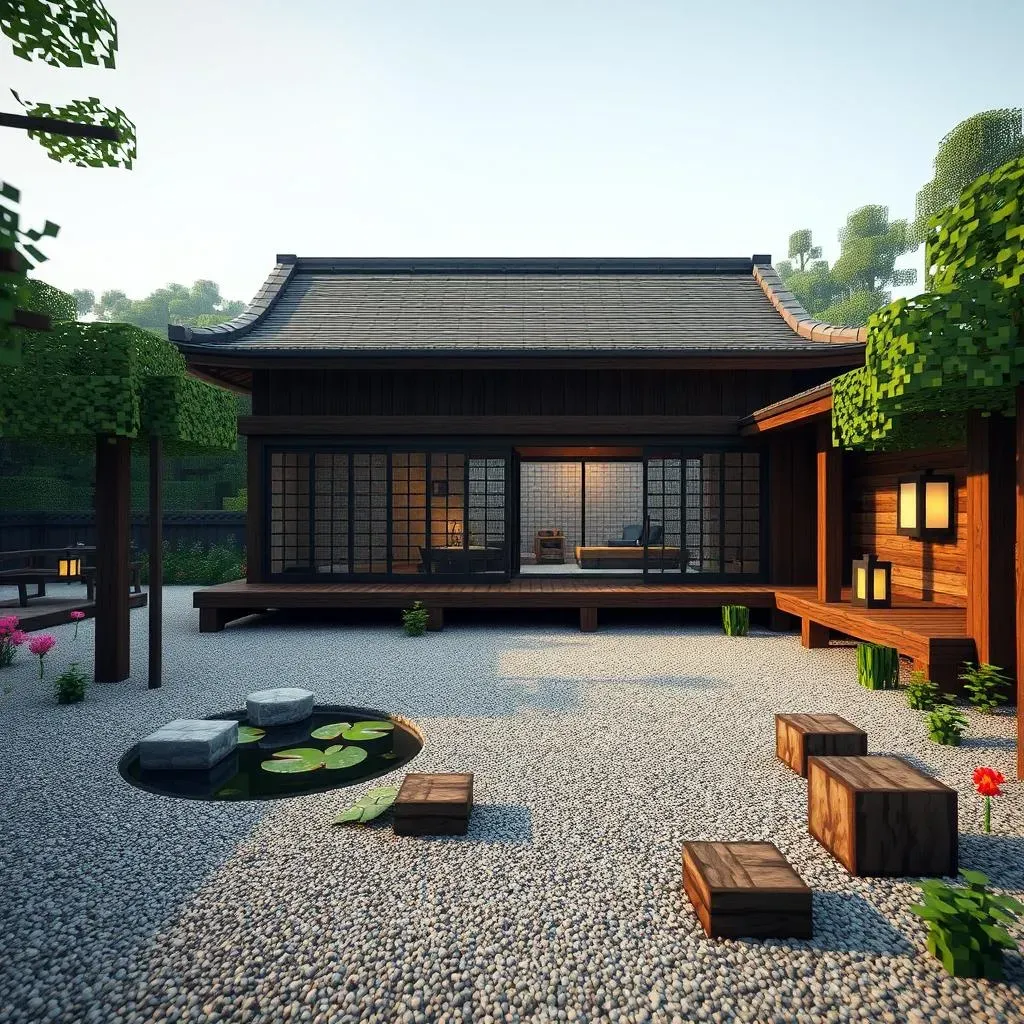
Adding the Finishing Touches: Gardens and Details for Your Minecraft Japanese House
Creating a Serene Garden
Okay, so you've built your fantastic Japanese house, with that amazing roof, but what's a house without a garden? A Japanese garden isn't just a bunch of random plants; it's a carefully curated space designed to bring peace and harmony. Think about it as an extension of your house. You'll want to use a lot of natural elements like gravel, sand, and of course, plants. Bamboo is a classic choice, but since we don't have it in Minecraft, we can use dark oak saplings and leaves to create a similar feel. Use coarse dirt and gravel to create paths, and try using different types of flowers to add a splash of color. You can also add a small pond with some lily pads and maybe even some fish if you're feeling ambitious. The goal is to create a space that feels both calming and beautiful. It's a place where you can relax and enjoy the view of your amazing house.
I personally love adding a small zen garden with some carefully placed stone blocks, it makes the whole place feel more peaceful. Don't underestimate the power of a well-placed garden, it can truly transform your build.
Adding Interior Details
Now let's think about the inside. Japanese homes are known for their minimalist design, so don't go overboard with the furniture. A few simple beds, crafting tables, and chests are all you really need. Use a lot of wood to keep that natural feel, and maybe add some lanterns for light. You can also use banners to create simple wall hangings. I like to add tatami mats made of stripped oak wood to add a texture to the floor. Remember, the goal is to create a space that's functional and clutter-free. Keep it simple and elegant, just like in a real Japanese home. Also, do not forget the sliding doors, you can make these with trapdoors or fence gates, and it will make the build feel more authentic.
Element | Minecraft Block | Why? |
|---|---|---|
Pathways | Gravel, Coarse Dirt | Natural feel |
Bamboo | Dark Oak Saplings/Leaves | Adds height and texture |
Pond | Water, Lily Pads | Calming element |
Zen Garden | Stone, Gravel | Peaceful atmosphere |
Tatami Mats | Stripped Oak Wood | Texture on the floor |
Sliding Doors | Trapdoors/Fence Gates | Authentic detail |
Personal Touches and Final Thoughts
The most important part of any build is to make it yours. Add some personal touches, maybe a small shrine, or a unique roof design. The possibilities are endless. The beauty of Minecraft is that you can always change things around and experiment. Don't be afraid to make mistakes, it's part of the learning process. Building a Japanese house is about more than just following a set of instructions; it's about expressing your creativity and creating something that you can be proud of. So, go ahead, build your dream Japanese house, and most importantly, have fun doing it. And remember, I'm always here to help if you need some more tips.
"Have no fear of perfection, you'll never reach it." - Salvador Dali
